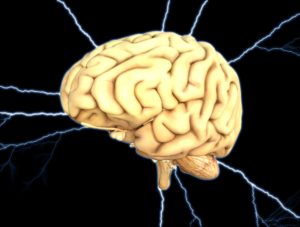
Image credit: Coffee Geek
A study recently published in the journal Scientific Reports found that 24 compounds, including caffeine, could increase production of an enzyme in the brain that’s been shown to combat dementia. The enzyme, NMNAT2, was discovered last year by a team of researchers at Indiana University.
The previous study, whose authors also co-wrote the new report, found that the NMNAT2 enzyme plays two critical roles in the brain: it protects neurons from stress, and acts as a “chaperone” to fight misfolded tau proteins. When tau proteins misfold and clump together in the brain, they form “plaques” or “tangles.” The accumulation of these plaques and tangles is a factor in the development of many neurodegenerative disorders, including Alzheimer’s disease. As a “chaperone,” NMNAT2 binds to misfolded proteins to combat the effects of these clumps.
The newly published study was led by Hui-Chen Lu, a Gill Professor at the Linda and Jack Gill Center for Biomolecular Science and the Department of Psychological and Brain Sciences at Indiana University. Her team tested more than 1,280 substances to identify compounds that could affect production of NMNAT2 in the brain. They found 24 compounds that increased the creation of the enzyme in the brains of mice. One of the more interesting and beneficial substances was caffeine.
The researchers dispensed caffeine to mice who’d been genetically modified to produce lower levels of NMNAT2. After receiving the caffeine, the modified mice eventually came to produce the same levels of the enzyme as their non-modified cohorts.
Rolipram was another compound that significantly increased production of NMNAT2 in the brain. Developed in the 1990s as an antidepressant, Rolipram never made it to market due to its unacceptable side effects However, it is still useful to researchers because it appears to mitigate the impact of tangled brain proteins.
“This work could help advance efforts to develop drugs that increase levels of this enzyme in the brain, creating a chemical ‘blockade’ against the debilitating effects of neurodegenerative disorders,” Dr. Lu said.
Some of the other compounds found to increase production of the beneficial enzyme were ziprasidone, cantharidin and retinoic acid. Retinoic acid is of significance because it derives from vitamin A. It’s worth noting that none of these were nearly as effective as caffeine or rolipram.
Compounds That Decrease NMNAT2 Also Found
As with most scientific studies, the researchers also found compounds that had the opposite effect of caffeine on NMNAT2 production. Of those they studied, 13 substances potentially lowered production levels of the enzyme. These compounds are equally as important because knowing about their role in the body could provide insight into how they contribute to dementia.
“Increasing our knowledge about the pathways in the brain that appear to naturally cause the decline of this necessary protein is equally as important as identifying compounds that could play a role in future treatment of these debilitating mental disorders,” Lu said.
As the population ages, it’s likely that the number of neurodegenerative disorders will also rise. Alzheimer’s, the most common, currently affects over 5.4 million Americans. Any research that leads to potential treatments or cures for these diseases is a step forward for us all.

 Caffeine, Other Substances Found to Increase Enzyme That May Combat Dementia
Caffeine, Other Substances Found to Increase Enzyme That May Combat Dementia




 The Healing Sound of Singing Bowls
The Healing Sound of Singing Bowls














